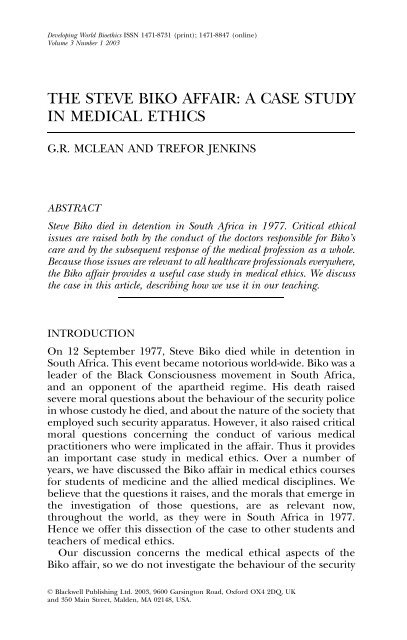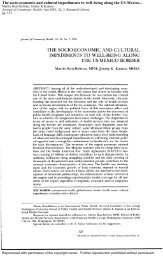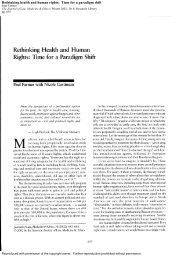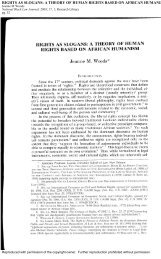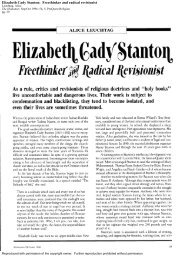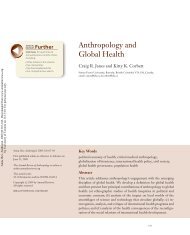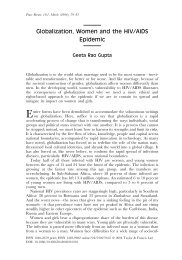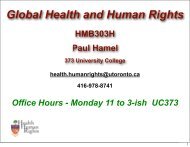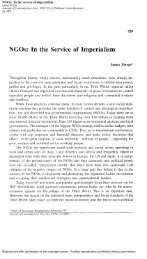THE STEVE BIKO AFFAIR: A CASE STUDY IN MEDICAL ETHICS
THE STEVE BIKO AFFAIR: A CASE STUDY IN MEDICAL ETHICS
THE STEVE BIKO AFFAIR: A CASE STUDY IN MEDICAL ETHICS
Create successful ePaper yourself
Turn your PDF publications into a flip-book with our unique Google optimized e-Paper software.
Developing World Bioethics ISSN 1471-8731 (print); 1471-8847 (online)<br />
Volume 3 Number 1 2003<br />
<strong>THE</strong> <strong>STEVE</strong> <strong>BIKO</strong> <strong>AFFAIR</strong>: A <strong>CASE</strong> <strong>STUDY</strong><br />
<strong>IN</strong> <strong>MEDICAL</strong> <strong>ETHICS</strong><br />
G.R. MCLEAN AND TREFOR JENK<strong>IN</strong>S<br />
ABSTRACT<br />
Steve Biko died in detention in South Africa in 1977. Critical ethical<br />
issues are raised both by the conduct of the doctors responsible for Biko's<br />
care and by the subsequent response of the medical profession as a whole.<br />
Because those issues are relevant to all healthcare professionals everywhere,<br />
the Biko affair provides a useful case study in medical ethics. We discuss<br />
the case in this article, describing how we use it in our teaching.<br />
<strong>IN</strong>TRODUCTION<br />
On 12 September 1977, Steve Biko died while in detention in<br />
South Africa. This event became notorious world-wide. Biko was a<br />
leader of the Black Consciousness movement in South Africa,<br />
and an opponent of the apartheid regime. His death raised<br />
severe moral questions about the behaviour of the security police<br />
in whose custody he died, and about the nature of the society that<br />
employed such security apparatus. However, it also raised critical<br />
moral questions concerning the conduct of various medical<br />
practitioners who were implicated in the affair. Thus it provides<br />
an important case study in medical ethics. Over a number of<br />
years, we have discussed the Biko affair in medical ethics courses<br />
for students of medicine and the allied medical disciplines. We<br />
believe that the questions it raises, and the morals that emerge in<br />
the investigation of those questions, are as relevant now,<br />
throughout the world, as they were in South Africa in 1977.<br />
Hence we offer this dissection of the case to other students and<br />
teachers of medical ethics.<br />
Our discussion concerns the medical ethical aspects of the<br />
Biko affair, so we do not investigate the behaviour of the security<br />
ß Blackwell Publishing Ltd. 2003, 9600 Garsington Road, Oxford OX4 2DQ, UK<br />
and 350 Main Street, Malden, MA 02148, USA.
78 G.R. MCLEAN AND TREFOR JENK<strong>IN</strong>S<br />
police. We present an outline of the relevant parts of the history<br />
of the case, and we guide the students, interactively, through an<br />
ethical analysis of what that history reveals. For our purposes, the<br />
history of the affair is usefully divided into two phases: the first<br />
phase concerns the conduct of the individual doctors responsible<br />
for Biko's medical care while he was in detention; the second<br />
phase concerns the collective medical profession's response to<br />
the individual doctors' performance. We consider each phase in<br />
turn.<br />
PHASE I: <strong>THE</strong> <strong>IN</strong>DIVIDUAL LEVEL<br />
I.1 History of Phase I<br />
Steve Biko was arrested on 18 August 1977, and detained by the<br />
security police under legislation that allowed him to be held<br />
indefinitely. This was not his first experience of detention: he<br />
had been detained on a number of previous occasions, including<br />
for a period of 101 days in the previous year.<br />
In our review of the events that followed, our focus is upon two<br />
district surgeons, Dr Ivor Lang and Dr Benjamin Tucker. A<br />
district surgeon is a general practitioner, employed by South<br />
Africa's Department of Health, whose responsibilities include the<br />
provision of medical care for prisoners and other detainees.<br />
On 6 September, Biko was taken from his place of close<br />
confinement to the Port Elizabeth security police headquarters<br />
for interrogation. On the morning of the following day, Colonel<br />
Goosen, regional head of the security police, summoned Dr Lang<br />
to examine Biko. Goosen had been informed by one of the<br />
interrogators that Biko was behaving strangely, and refusing to<br />
respond to questions; he asked Dr Lang to examine Biko for a<br />
possible stroke. However, at some stage Col. Goosen also raised<br />
the question of whether Biko might be feigning, or shamming,<br />
his symptoms. He pointed out that Biko had been a medical<br />
student some years previously, and he claimed that Biko had<br />
exhibited `similar symptoms' during a previous period of<br />
detention.<br />
In her book, Turning a Blind Eye? Medical Accountability and the<br />
Prevention of Torture in South Africa, Mary Rayner helpfully takes up<br />
the account of events from this point:<br />
In Goosen's presence Lang examined the detainee, who was<br />
lying on a mat, manacled to a metal grille in an office at<br />
security police headquarters.<br />
ß Blackwell Publishing Ltd. 2003
<strong>THE</strong> <strong>STEVE</strong> <strong>BIKO</strong> <strong>AFFAIR</strong> 79<br />
During his examination, which was made at floor level, Dr<br />
Lang found a laceration on the patient's upper lip which was<br />
edematous, a superficial bruise over the sternum at approximately<br />
the level of the second rib, a ring mark around each<br />
wrist, and edema of both hands, feet, and ankles. The detainee<br />
also walked with an ataxic gait and spoke in a slurred manner.<br />
When asked by Col. Goosen for a medical certificate, Dr Lang<br />
wrote:<br />
This is to certify that I have examined Steve Biko as a result<br />
of a request from Col. Goosen of the security police who<br />
complained that the above-mentioned would not speak. I<br />
have found no evidence of any abnormality or pathology on<br />
the patient.<br />
The next day Dr Lang was summoned again. This time he<br />
examined the detainee in the company of his superior, Dr<br />
Benjamin Tucker, the chief district surgeon for Port Elizabeth.<br />
The patient, still shackled to the grille, was lying on a mat now<br />
soaked with urine. During the examination, Dr Tucker observed<br />
a possible extensor plantar reflex in the patient, who also<br />
complained of a pain in his head. Tucker and Lang contacted<br />
Dr Hersch, a specialist in private practice, who agreed to<br />
examine Biko at Sydenham Prison Hospital. On 9 September,<br />
Dr Hersch performed a lumbar puncture, the results of which<br />
revealed bloodstaining in the cerebrospinal fluid. A neurosurgeon,<br />
Dr Keeley, was consulted by phone. Although Keeley<br />
seemed not unduly worried regarding the patient's condition,<br />
he advised Dr Lang to keep Biko under close observation.<br />
Apparently because the prison hospital had no observation<br />
facilities, Dr Lang arranged for the patient to be transferred to<br />
the Walmer police station cells. As his final entry in the bed<br />
letter (medical record) at Sydenham Prison Hospital on 10<br />
September, Dr Lang wrote: `No change in condition. Have<br />
informed him (Biko) that Dr Hersch and myself find no<br />
pathology, that lumbar puncture was normal, and as a result, I<br />
was returning him to the police cells.'<br />
At the police station, the patient was left lying on a mat on the<br />
cement floor of the cell. Occasionally a police warden looked in<br />
on him. On the afternoon of 11 September, Col. Goosen again<br />
called Dr Tucker to the station. A police warden had found Biko<br />
collapsed, glassy-eyed, hyperventilating, and frothing at the<br />
mouth. After a five-minute examination, Dr Tucker suggested<br />
that the patient be transferred to a provincial hospital in Port<br />
Elizabeth, but Col. Goosen refused to allow it. Tucker<br />
ß Blackwell Publishing Ltd. 2003
80 G.R. MCLEAN AND TREFOR JENK<strong>IN</strong>S<br />
acquiesced in this and gave his permission to the police for the<br />
patient to be transferred by motor vehicle 750 miles to Pretoria.<br />
On the night of 11 September, the semi-comatose patient,<br />
naked and handcuffed, was placed on some cell mats on the<br />
floor of a Land Rover and driven to Pretoria Central Prison.<br />
Biko was unaccompanied by any medical personnel during this<br />
long journey. No medical records on Biko's condition were sent<br />
with him. Several hours after his arrival at the prison, Biko was<br />
examined by district surgeon Dr A van Zyl. Without any<br />
information about the patient other than that he was refusing<br />
to eat, Dr Van Zyl administered an intravenous drip and a<br />
vitamin injection. During the night of 12 September 1977, Steve<br />
Biko died lying on a floor mat and unattended. 1<br />
I.2 What wrongs occurred?<br />
Having recounted the history of this phase of the case, we invite<br />
the students to evaluate the clinical performance of the doctors.<br />
We expect them to identify the following particular features. (In<br />
what follows, we list the particular acts and omissions alongside<br />
the general clinical rules or principles against which they are to<br />
be evaluated.)<br />
(i) Drs Lang and Tucker seemed to be unconcerned about the<br />
conditions under which Biko was being detained: he was<br />
naked, manacled, chained and, on the second day, lying on a<br />
urine-soaked mat. It is axiomatic that a patient should be examined<br />
on a couch or bed at a convenient height, under proper lighting, with<br />
all necessary diagnostic equipment, gloves, etc. In prison situations,<br />
the doctor should request that instruments of restraint be removed so<br />
that a full and proper examination can be performed. The doctor<br />
ought to explain to the prisoner that he approaches the prisoner as a<br />
doctor, and that he views the prisoner first and foremost as his<br />
patient. If necessary, the doctor ought to issue instructions that the<br />
patient be kept under properly hygienic conditions.<br />
(ii) The medical examinations were inadequate in many respects.<br />
Neither doctor asked Biko how he sustained his<br />
injuries; the security police were also not asked. In fact, the<br />
doctors failed to take a history. The taking of a detailed and<br />
accurate history is essential if a correct diagnosis is to be made.<br />
1 M. Rayner. 1987. Turning a Blind Eye? Medical accountability and the prevention<br />
of torture in South Africa. Washington, DC. American Association for the<br />
Advancement of Science: 23±25.<br />
ß Blackwell Publishing Ltd. 2003
(iii) There was no assessment of the patient's mental state; Dr<br />
Tucker said that he was alert. In a case of suspected head injury<br />
or intracranial pathology ± Col. Goosen had said that he suspected a<br />
stroke ± an abnormal mental state is an important differentiating<br />
sign.<br />
(iv) The doctors were subservient to the police, allowing Col.<br />
Goosen to be present throughout their examination of<br />
Biko. They were influenced by Goosen's opinion that Biko<br />
may be shamming. (After all, he had been a medical<br />
student.) If the doctor-patient relationship is to be effective, the<br />
doctor must ensure that his examination is independent of any<br />
interference and, if possible, that it is performed confidentially and<br />
privately. The doctor must proceed with full independence of mind if<br />
he is to make a properly objective, unprejudiced diagnosis.<br />
(v)<br />
<strong>THE</strong> <strong>STEVE</strong> <strong>BIKO</strong> <strong>AFFAIR</strong> 81<br />
On the first day that Dr Lang saw Biko he wrote a false<br />
medical certificate, failing to note injuries on the face and<br />
chest, an ataxic gait and slurred speech. When writing a<br />
medical certificate it is essential that all injuries and positive<br />
physical signs be recorded fully and accurately. A medical certificate<br />
has great public and legal significance. It can be the basis upon<br />
which the patient is awarded sick leave, or is pensioned, or receives<br />
compensation or exemption from military service, or is institutionalised,<br />
etc. It will also certify whether or not the patient has received<br />
injury, e.g. at the hands of the police. Hence, the doctor enjoys a<br />
unique privilege, but also exercises enormous power, when he issues<br />
a medical certificate. Given this privilege and power, it is absolutely<br />
essential that the doctor acts with scrupulous truthfulness and<br />
responsibility.<br />
(vi) On 10 September, in spite of the slurred speech, a left sided<br />
positive plantar reflex (Babinski sign), left sided weakness,<br />
and the presence of blood in the CSF (each of which is a<br />
sign of brain damage), Dr Lang could write in the patient's<br />
notes: `No change in condition. Have informed him [Biko]<br />
that Hersch and myself find no pathology, that lumbar<br />
puncture was normal and, as a result, I was returning him to<br />
the police cells.' Maintaining a full and accurate record of the<br />
patient's condition, including its progress and physical signs and<br />
symptoms and investigations and treatment, is a fundamental<br />
requirement for proper continuing medical care. The doctor bears a<br />
duty of honesty to the patient. In a way that is properly balanced by<br />
his duty of care for the patient, he must keep the patient truthfully<br />
informed about his medical condition and treatment.<br />
(vii) Having sent Biko to the police cells, contrary to the specialist's<br />
instruction, Dr Lang gave no directive concerning the<br />
ß Blackwell Publishing Ltd. 2003
82 G.R. MCLEAN AND TREFOR JENK<strong>IN</strong>S<br />
need for careful observation. One of the most important<br />
requirements in the care of a patient with a suspected head injury<br />
is the regular and frequent ± perhaps half-hourly ± monitoring of<br />
pulse and respiratory rates and level of consciousness, assessed by<br />
appropriate clinical techniques.<br />
(viii) Drs Lang and Tucker failed to insist on proper hospitalisation<br />
or to keep the specialists (Drs Hersch and Keeley)<br />
informed about their patient's condition. The patient must be<br />
nursed in a properly equipped and suitably staffed facility where the<br />
required observations can be made and interpreted and adequate<br />
ongoing care provided.<br />
(ix) Dr Tucker acquiesced in the plan of the police to send Biko<br />
to a prison hospital in Pretoria (1200km away) and did<br />
nothing to ensure that the transport arrangements were<br />
adequate; he failed to insist that an ambulance be used or<br />
that there must be a medical attendant; and he failed to<br />
provide a medical report or a referral letter to accompany<br />
the patient. It is the doctor's professional judgement that must<br />
determine the nature of the patient's care, and the doctor must not<br />
allow any extraneous factor to interfere with that judgement. When<br />
a doctor transfers a patient to another doctor, it is essential that the<br />
second doctor be provided with a full record of the relevant medical<br />
facts.<br />
In general, the doctors' performance displayed a profound<br />
failure of care. Biko received from them virtually none of the<br />
treatment and general care that his condition required.<br />
I.3 Why did these wrongs occur?<br />
Why did Drs Lang and Tucker behave as they did? This is the<br />
next question that we put to our students. How could these<br />
doctors, trained in the best traditions of Western medicine, have<br />
acted in that way?<br />
Our students typically propose a number of different explanations.<br />
However, some of the explanations that naturally come to<br />
mind do not, in fact, fit all the facts of the case. We list below the<br />
standard suggestions, and our responses to them. As will be seen,<br />
the first three suggestions turn out, we believe, to be incorrect.<br />
(i) `The doctors were plainly incompetent.'<br />
The standard of the physical examination and the diagnostic<br />
skills exhibited by Drs Lang and Tucker have been<br />
considered by some medical colleagues to be deplorably low<br />
± poorer than that of a medical student who has not yet<br />
ß Blackwell Publishing Ltd. 2003
<strong>THE</strong> <strong>STEVE</strong> <strong>BIKO</strong> <strong>AFFAIR</strong> 83<br />
received any clinical training, was the opinion of one.<br />
However, the wider facts of the case show that we cannot<br />
attribute their shocking performance merely to incompetence.<br />
A very famous South African-born physician, Sir<br />
Raymond Hoffenberg, wrote: `I do not know what motivated<br />
Lang or Tucker. I do not believe they were clinically<br />
incompetent or ignorant . . . they may have felt their jobs<br />
were in jeopardy . . . Where was their professional ± or<br />
personal ± conscience?' 2 Hoffenberg is making the point<br />
that the doctors' care was so generally callous, in so many<br />
different respects, that it cannot be attributed merely to<br />
incompetence. In the sequel to these events, the doctors<br />
clearly demonstrated that they understood the significance<br />
of the ataxia and the blood in the CSF, the Babinski sign,<br />
and so on, and that they understood what proper care of a<br />
brain-damaged patient would entail.<br />
(ii) `The law made them do it.'<br />
In trying to explain the deplorable care provided by the<br />
doctors, many students suppose that the law governing the<br />
medical care of prisoners and detainees was at fault. Now it<br />
is true that a good deal of apartheid law was bad law. But<br />
that is not the explanation in this case. For in fact the<br />
relevant law and the regulations governing the medical care<br />
of prisoners and detainees was clearly intended to ensure<br />
care of proper quality. (District surgeons are general<br />
practitioners employed by the Department of Health.<br />
Among other responsibilities, they were required to provide<br />
medical care to prisoners under regulation 6 of the prison<br />
regulations promulgated in 1965 under Prisons Act 8 of<br />
1959.) The law was in effect requiring these doctors to<br />
provide fully competent and committed medical care to<br />
Steve Biko, and to any other prisoner or detainee.<br />
(iii) `They were intimidated by the security forces.'<br />
Many students imagine that the doctors were intimidated,<br />
perhaps even coerced, by the security police, and so had no<br />
real freedom to provide better care. But none of this is<br />
borne out by the evidence of the case. Although, as we shall<br />
see, the doctors adopted a subservient attitude to the<br />
security police when advising on the care and management<br />
of their patient, they were under no clear intimidatory<br />
pressure. Indeed, the evidence that later emerged showed<br />
2 R. Hoffenberg. Doctors and society ± the Biko Lecture. South African<br />
Medical Journal 1994; 84: 245±249 (248).<br />
ß Blackwell Publishing Ltd. 2003
84 G.R. MCLEAN AND TREFOR JENK<strong>IN</strong>S<br />
that the security police were anxious that Biko should not be<br />
allowed to die while in their charge. It may have been that<br />
more subtle pressures were operating in the doctors' minds:<br />
perhaps they feared the loss of their jobs (and pension<br />
benefits) or ostracism by colleagues and members of their<br />
section of society. But even if this was the case, it was not the<br />
case that the doctors' freedom to provide proper care had<br />
been removed by the security police.<br />
(iv) A wrong set of attitudes, and an absence of professional commitment.<br />
Given that the doctors' failures were not due to mere incompetence<br />
or external restraint, they need to be explained in<br />
terms of a set of attitudes. Clearly, the doctors did not<br />
conduct themselves towards Biko in the way that any ordinary<br />
doctor would professionally conduct himself towards any<br />
ordinary patient: they did not take his symptoms seriously,<br />
and they displayed an appalling indifference to his wellbeing.<br />
Why did they not regard him in the way that any<br />
doctor should regard any patient? And why did they allow his<br />
treatment to be governed, not by medical considerations, but<br />
by the interests of the security police?<br />
Derrick Silove, a South African-trained psychiatrist who<br />
practises in Australia, has provided a helpful analysis of the<br />
factors that shape the kinds of attitudes displayed by Drs<br />
Tucker and Lang. Writing in 1990, Silove pointed out that `a<br />
number of powerful social and psychological influences<br />
undoubtedly contributed to the Biko doctors' gross lapses<br />
in judgment . . . the most general influence which affects all<br />
members of South African society is the all-pervasive ethos<br />
which portrays the black person as an `untermensch', an<br />
inferior being, to whom one simply does not accord the same<br />
respect as one does to a white person.' 3 Medicine had<br />
become as tainted by apartheid as had any other sphere of<br />
interaction between people in South Africa. Furthermore,<br />
because Drs Lang and Tucker had for decades been working<br />
alongside the police, in institutions governed by the attitudes<br />
of the police, they could, very naturally, have assumed those<br />
attitudes as their own, and have become accustomed to the<br />
conduct within those institutions. We can readily imagine<br />
that they had found themselves on a `slippery slope' of<br />
declining standards leading to a condition of `unethical<br />
compliance with acts of brutality.' They had become<br />
3 D. Silove. Doctors and the State: Lessons from the Biko Case. Social Science<br />
and Medicine 1990; 30: 417±429 (422).<br />
ß Blackwell Publishing Ltd. 2003
<strong>THE</strong> <strong>STEVE</strong> <strong>BIKO</strong> <strong>AFFAIR</strong> 85<br />
`habituated' to the methods used by the security police when<br />
they dealt with black people; they had ceased to see prisoners<br />
and detainees, particularly when they were black, as their<br />
patients. 4<br />
Confronted by a patient who was portrayed by his captors as<br />
a `dangerous terrorist' who, because he had been a medical<br />
student, would know how to feign symptoms, the doctors'<br />
assessment of their patient was distorted to such an extent that<br />
the obvious signs and symptoms of brain pathology were not<br />
taken seriously. Because they approached Biko with<br />
insufficient regard, they were not motivated by the concern<br />
that would have led to a proper investigation of his condition,<br />
and to his proper care. Because they had allied themselves<br />
with the security police, they allowed his treatment to be<br />
dictated by what the security police wanted, and not by what<br />
the relevant medical considerations required.<br />
In seeking to understand this appallingly bad care, we are<br />
greatly assisted by the `confession' made by Dr. Tucker himself<br />
in 1991, in his (successful) application to the South African<br />
Medical and Dental Council for reinstatement on the medical<br />
register. (We quote a small part of it here.):<br />
For a long time following the events of September 1977 . . .<br />
I had attempted to deny to myself the truth of my role in<br />
what has become known as the `Biko affair' . . . I found it<br />
difficult to admit to myself that my conduct with regard to<br />
my attendance to the late Mr Biko, and also my conduct<br />
subsequent to his death, fell far short of the standards<br />
required of a medical practitioner . . . I came to realise that<br />
over the period of the 30 years I had at that time been<br />
employed by the State as a district surgeon, I had gradually<br />
lost the fearless independence that is required of a<br />
medical practitioner when the interests of his patient are<br />
threatened. I had become too closely identified with the<br />
interest of the organs of the State, especially the police<br />
force, with which I dealt practically on a daily basis . . . I<br />
have come to realise that a medical practitioner's primary<br />
consideration is the well-being of his patient, and that a<br />
medical practitioner cannot subordinate his patient's<br />
interest to extraneous considerations. 5<br />
4 Ibid. p. 422 ff.<br />
5 B. Tucker. Years of sorrow, despair. The Sunday Star. Johannesburg. October<br />
20, 1991.<br />
ß Blackwell Publishing Ltd. 2003
86 G.R. MCLEAN AND TREFOR JENK<strong>IN</strong>S<br />
I.4 What morals emerge?<br />
The case of the Biko doctors is not merely of historical interest.<br />
And it is neither a unique nor a particularly unusual case. It is<br />
one of many similar cases that have occurred in South Africa and<br />
in other parts of the world. The morals that emerge from the case<br />
are relevant for all healthcare professionals wherever they may be<br />
practising; and this is the most important part of our discussion<br />
with students. What are these morals?<br />
The doctors' relationship to Biko should have been primarily the<br />
relationship between a doctor and his patient; their commitment of<br />
care to Biko should have been the same commitment as is proper<br />
in the treatment of any patient. But as we have seen, other<br />
considerations ± considerations that are strictly irrelevant to the<br />
concern of a doctor for his patient ± were allowed to intervene. We<br />
have already heard Dr. Tucker stressing this fact: `. . . a medical<br />
practitioner's primary consideration is the well-being of his<br />
patient', and he `cannot subordinate his patient's interest to<br />
extraneous considerations.' Dr. Tucker went on to add: `In his<br />
examination, diagnosis and treatment of a patient, a medical<br />
practitioner should fearlessly take those steps which are required<br />
for the well-being of the patient.' 6<br />
Nor is this merely one man's understanding of the<br />
professional role. The world-wide medical profession, through<br />
its instrument, the World Medical Association, has professed the<br />
same understanding of professional responsibility and its<br />
implications. In the preamble to its Declaration of Tokyo, 7 the<br />
WMA affirmed that:<br />
. . . it is the privilege of the medical doctor to practise medicine<br />
in the service of humanity, to preserve and restore bodily and<br />
mental health without distinction as to persons, to comfort<br />
and to ease the suffering of his or her patients. The utmost<br />
respect for human life is to be maintained even under threat,<br />
and no use made of any medical knowledge contrary to the<br />
laws of humanity.<br />
And one of the implications it draws from this understanding of<br />
its medical role is stated in Paragraph 4 of the Declaration:<br />
A doctor must have complete clinical independence in<br />
deciding upon the care of a person for whom he or she is<br />
6 Ibid.<br />
7 Included as an Appendix in Rayner, op. cit. note 1.<br />
ß Blackwell Publishing Ltd. 2003
<strong>THE</strong> <strong>STEVE</strong> <strong>BIKO</strong> <strong>AFFAIR</strong> 87<br />
medically responsible. The doctor's fundamental role is to<br />
alleviate the distress of his or her fellow men, and no motive<br />
whether personal, collective or political shall prevail against<br />
this higher purpose.<br />
Clearly, this entails that the fact that a patient belongs to a<br />
particular racial or ethnic group, the fact that the patient is a<br />
prisoner or a detainee, the fact that the patient may pose some<br />
threat to the state, etc, are all facts which are irrelevant to the<br />
doctor's commitment to the patient as patient. The fact that other<br />
parties may have interests that conflict with the medical interest<br />
of the patient is also irrelevant to the doctor's concern for the<br />
patient as patient.<br />
But there is also a second moral. Observing and maintaining<br />
this unqualified commitment to the medical care of the patient<br />
may, in certain circumstances, be difficult. Many of the cases that<br />
are studied in medical ethics are hard cases, insofar as it is<br />
difficult to ascertain what one ought to do: the situations<br />
described may pose a genuine ethical dilemma or at least<br />
represent some tension between different, countervailing<br />
considerations, and it may be difficult to find the right balance<br />
between these considerations, the right resolution of the tension.<br />
However, there are other kinds of hard cases that are not hard<br />
because it is difficult to ascertain what one ought to do. Rather,<br />
they are hard because it is hard to do what one ought to do. The<br />
Biko case falls into this latter category. It is not a case in which we<br />
are presented with great theoretical difficulty in ascertaining the<br />
doctors' professional duty. Their duty was clear; doing it was<br />
difficult. A clear-sighted performance of their professional duty<br />
required them to withstand the social, psychological and<br />
institutional pressures to which they had been subject for many<br />
years. This fact forcefully raises the question: how is one to<br />
ensure that when one finds oneself confronted by a hard case of<br />
this kind, one will do the right thing?<br />
The answer to this question is that one needs to have been<br />
personally prepared in such a way that one can be relied upon to act<br />
rightly when the hard case crops up, or when one finds oneself<br />
continually subject to more or less subtle pressures of the wrong<br />
kind. The Biko doctors had become habituated in wrong attitudes<br />
and practices. We need to develop habits of a different sort.<br />
Healthcare professionals need to possess a clear-sighted understanding<br />
of the duties of the care-giver, and they need to commit<br />
themselves, and repeatedly to re-commit themselves, to<br />
maintaining this vision throughout a lifetime of practice. Each<br />
ß Blackwell Publishing Ltd. 2003
88 G.R. MCLEAN AND TREFOR JENK<strong>IN</strong>S<br />
individual healthcare professional needs to make this vision and<br />
commitment his or her own. Moreover, conduct that remains<br />
consistent with this vision will depend upon the healthcare<br />
professional's possession of a variety of personal qualities, themselves<br />
dependent upon habit-forming practice. These required<br />
character traits, or virtues, surely include the following: fidelity to<br />
the carer-patient relationship; benevolence, the commitment to the<br />
good of the patient; compassion, including sympathy and empathy;<br />
discernment, which enables one to identify forces at work and to<br />
distinguish what is relevant from what is irrelevant; truthfulness and<br />
trustworthiness; and, as Dr Tucker himself stressed, courage.<br />
We may be tempted to think that a rich list of the virtues<br />
displays a character of an extraordinary kind, and that because<br />
these are qualities required by heroes, we ordinary mortals can<br />
content ourselves with a lower standard. But in fact, unless these<br />
character traits are very firmly in place, the ordinary healthcare<br />
professional is very likely to fail, and to fail very badly indeed, in<br />
the kind of situation in which the Biko doctors found themselves.<br />
In other words, the virtues are what every ordinary person needs<br />
if he is to manage to do the right thing in each kind of case with<br />
which he may be confronted.<br />
So we need to be committed, in advance, to preparing ourselves<br />
for the hard cases by preparing our characters ± by training in the<br />
virtues. And the need for this personal preparation has wide<br />
implications for medical education. How can the student be<br />
nurtured in these commitments and habits? There is a need for<br />
mentoring; and the place of role models in this task is clear.<br />
PHASE II: <strong>THE</strong> COLLECTIVE PROFESSIONAL LEVEL<br />
II.1 History of Phase II<br />
In considering the second phase of the Biko affair, the sequel to<br />
his death, our concern is with the response by the medical<br />
profession as a whole to the performance of the Biko doctors. As<br />
we review the events in this phase, our focus is upon two players<br />
in the drama: first, and most importantly, the South African<br />
Medical and Dental Council; secondly, the Medical Association of<br />
South Africa.<br />
The South African Medical and Dental Council (SAMDC) was<br />
South Africa's principal regulatory body controlling the medical<br />
and dental professions during the period in which Biko died, and<br />
in fact until a few years ago, when it was replaced by the Health<br />
Professions Council of South Africa. It was a 34 member statutory<br />
ß Blackwell Publishing Ltd. 2003
<strong>THE</strong> <strong>STEVE</strong> <strong>BIKO</strong> <strong>AFFAIR</strong> 89<br />
body entrusted with the duty, under an Act of Parliament, to<br />
license and control the training of members of the medical and<br />
dental professions, and to uphold ethical and medical standards.<br />
The Council was vested with quasi-judicial powers to regulate the<br />
conduct of these professions, including the power to inquire into<br />
the conduct of individual professionals, and to discipline any who<br />
may be judged to have behaved unprofessionally or disgracefully;<br />
such discipline may extend to striking a person off the register of<br />
licensed practitioners. In other words, the SAMDC was required<br />
by law to act as the official watchdog of the medical profession.<br />
The Medical Association of South Africa, or MASA, (now<br />
known as SAMA or the South African Medical Association) is a<br />
voluntary body of doctors to which 70 to 80% of the nation's<br />
doctors belong. It represents the interests of medical practitioners<br />
by conducting negotiations with government and health<br />
care insurance (medical aid) schemes on their behalf. Although<br />
it does not have the legal backing of the SAMDC to discipline<br />
members of the Association, it is able to investigate the alleged<br />
unethical conduct of members and, if it finds them guilty, it has<br />
the power to suspend their membership of the Association.<br />
After Biko's death, an official autopsy was performed. Then, in<br />
November 1977, as the law required, an inquest was held in order<br />
to establish the cause of death. In spite of what to many observers<br />
was compelling evidence that Biko's death was caused by head<br />
injuries inflicted by his interrogators, the magistrate who presided<br />
over the inquest concluded that the likely cause of death was:<br />
Head injury with associated extensive brain injury, followed by<br />
contusion of the blood circulation, disseminated intravascular<br />
coagulation as well as renal failure with uraemia. The head<br />
injury was probably sustained during the morning of<br />
Wednesday, 7 September, 1977, when the deceased was<br />
involved in a scuffle with members of the Security Branch . . .<br />
The available evidence does not prove that the death was<br />
brought about by any act or omission involving or amounting<br />
to an offence on the part of any person.<br />
Thus, no blame was laid at the door of the security police.<br />
However, the magistrate did send relevant portions of the record<br />
of the inquest to the SAMDC ± as he was required by law to do if he<br />
felt that there was prima facie evidence of improper or disgraceful<br />
conduct on the part of the doctors. In effect, then, he was laying a<br />
complaint against the Biko doctors before the SAMDC.<br />
A month later, another complaint was independently laid by<br />
the ombudsman of the South African Council of Churches.<br />
ß Blackwell Publishing Ltd. 2003
90 G.R. MCLEAN AND TREFOR JENK<strong>IN</strong>S<br />
The SAMDC eventually held a Preliminary Inquiry to<br />
investigate these complaints. (For technical reasons, this inquiry<br />
had been delayed until April 1980.) After examining the evidence,<br />
the inquiry ruled that there was `no prima facie evidence'<br />
of misconduct by the Biko doctors.<br />
Many doctors were shocked by this ruling. In June 1980 some<br />
members of the MASA, of which Dr Tucker (but not Dr Lang)<br />
was also a member, called on the MASA to hold an inquiry to<br />
determine whether Dr Tucker `. . . is a fit and proper person to<br />
continue to be a member of this Association.' Two weeks later the<br />
MASA announced that a charge of unethical conduct against Dr<br />
Tucker could not be supported and that `the case is now closed.'<br />
The MASA also passed resolutions defending the `integrity and<br />
bona fides' of the members of the SAMDC and its committee of<br />
inquiry. They rejected any suggestion that there had been any<br />
attempt at a `cover-up' by the Council. Several of the leaders of<br />
the MASA were also members of the SAMDC, and, in their<br />
capacity as MASA members, began to attack those doctors who<br />
were critical of their actions. The official journal of the MASA,<br />
The South African Medical Journal, declined to publish letters of<br />
protest from leading academic doctors. A number of doctors<br />
resigned their membership of MASA in protest.<br />
A few South African doctors did pursue the issue further. First<br />
they laid their own complaint against the Biko doctors before the<br />
SAMDC. In March 1983 the SAMDC rejected this complaint, as it<br />
had the previous ones. This small group of doctors then took the<br />
matter to the Supreme Court. 8 They petitioned the Court to set<br />
aside the resolutions of the SAMDC and its inquiry committee,<br />
and to direct the Council to hold a new inquiry into the<br />
allegations of improper or disgraceful conduct on the part of Drs<br />
Lang and Tucker.<br />
In January 1985 the Court ruled in favour of the petitioning<br />
doctors. It held that there was prima facie evidence of improper or<br />
disgraceful conduct on the part of Drs Lang and Tucker. The<br />
Court repudiated the resolutions adopted by the SAMDC and<br />
directed the Council to set up a disciplinary committee to<br />
investigate the conduct of the two doctors.<br />
So in July 1985, nearly eight years after Biko's death, the<br />
SAMDC held a hearing that lasted for four days. The disciplinary<br />
committee found Dr Lang guilty of improper conduct on five<br />
8 The members of this group, who pursued the case at the risk of great cost<br />
to themselves, were Yosuf Veriava, Tim Wilson, Mumisame Mzamane, Frances<br />
Ames, Trefor Jenkins and Phillip Tobias.<br />
ß Blackwell Publishing Ltd. 2003
<strong>THE</strong> <strong>STEVE</strong> <strong>BIKO</strong> <strong>AFFAIR</strong> 91<br />
counts, in that he (1) had issued an incorrect medical certificate<br />
and a misleading bed letter (record of findings and care); (2)<br />
had failed to examine the patient properly; (3) had failed to<br />
inquire into and ascertain the possibilities of a head injury; (4)<br />
had failed to obtain a proper medical history of the patient; and<br />
(5) had failed to observe him and keep proper notes. Dr Lang<br />
was given a caution and a reprimand. Dr Tucker was found guilty<br />
of improper and disgraceful conduct on three counts: (1) he had<br />
failed to object to the patient's transport by Land Rover to<br />
Pretoria; (2) he should have insisted upon transportation by<br />
ambulance with proper medical attendants and the patient's<br />
medical records; and (3) he failed to make a proper medical<br />
check before stating that the patient's central nervous system had<br />
shown no changes between the examinations. The committee<br />
suspended Dr Tucker for three months from the medical roll,<br />
but recommended that this be suspended for two years,<br />
conditional on his not being found guilty by the SAMDC of any<br />
other contravention during this period. There was criticism by<br />
many doctors of the leniency of the sentences and a few months<br />
later the SAMDC decided that Dr Tucker's name should be<br />
immediately removed from the roll.<br />
II.2 What wrongs occurred?<br />
In discussing the second phase of the Biko affair, we invite the<br />
students to analyse the case by asking the same questions as were<br />
applied in analysis of the first phase. The students' task is to<br />
identify and explain the wrongs that occurred, and to consider<br />
what morals emerge.<br />
Our analysis of the first phase clearly showed that the Biko<br />
doctors' performance invited such descriptions as `improper'<br />
and `disgraceful.' Hence one would have had a right to expect<br />
that the body charged with the responsibility for maintaining the<br />
standards of the profession would have investigated the conduct<br />
of the doctors and disciplined them. However, over a period of<br />
nearly eight years the SAMDC steadfastly refused to accept that<br />
there was even prima facie evidence of misconduct on the part of<br />
Drs Lang and Tucker. This was surely a very grave wrong. The<br />
SAMDC signally failed to perform the role required of it both by<br />
the law and by its office as the principal council of the profession.<br />
The MASA also failed in its office as a representative of the<br />
profession. It refused to speak out against either the misconduct<br />
of the Biko doctors or the subsequent misconduct of the SAMDC.<br />
Instead, it sought to silence or to attack those of its members who<br />
ß Blackwell Publishing Ltd. 2003
92 G.R. MCLEAN AND TREFOR JENK<strong>IN</strong>S<br />
called upon it to make the correct stand. (It might be pointed out<br />
that the MASA also failed to speak out against many other<br />
instances of human rights abuses in the delivery of health care to<br />
members of the disadvantaged South African communities.)<br />
II.3 Why did these wrongs occur?<br />
Why did the SAMDC and the MASA behave so badly? In<br />
considering this question, students may offer suggestions that are<br />
similar to those which are typically offered in explanation of the<br />
misconduct of the Biko doctors; and some of these are similarly<br />
incorrect. We can hardly suppose that the members of the<br />
SAMDC and of the MASA were so incompetent that they were<br />
unable to discern medical misconduct. Nor can we suppose that<br />
they were restrained by bad law. On the contrary, the MASA was<br />
subject to no legal restraint. And the SAMDC was positively<br />
required by the law to act in the way they refused to do. They did<br />
so act only when they were forced to do so by the Supreme Court.<br />
Nor is there any evidence that members of the SAMDC or of the<br />
MASA were under real intimidatory pressure.<br />
Rather, the correct explanation surely parallels the explanation<br />
of the individual doctors' misconduct in their care for Biko.<br />
The SAMDC and the MASA were failing to concentrate upon the<br />
only question that mattered: did Biko receive the kind of medical<br />
care that any patient ought to receive as a patient? The members<br />
of these professional bodies belonged to the same society as the<br />
Biko doctors themselves; they were subject to similar social and<br />
psychological pressures, and they could easily have adopted<br />
similar attitudes towards blacks and detainees. In remarks to<br />
South Africa's Truth and Reconciliation Commission in June<br />
1997, Dr Hendrik Hanekom, former Secretary General of the<br />
MASA, expressed the following opinion:<br />
MASA was so wrapped up in its white, male, eÂlitist, educated,<br />
professional world as individuals and as a collective<br />
organisation and as part of a broader society from which<br />
doctors were drawn, that it failed to see the need to treat all<br />
people as equal human beings . . . MASA allowed black and<br />
white people to be treated differently, and this is the form of<br />
human rights violations for which it stands disgraced. 9<br />
9 Quoted in: L. Baldwin-Ragaven, J. de Gruchy and L. London. 1999. An<br />
Ambulance of the Wrong Colour: Health professionals, human rights and ethics in South<br />
Africa. Cape Town. University of Cape Town Press: 143.<br />
ß Blackwell Publishing Ltd. 2003
<strong>THE</strong> <strong>STEVE</strong> <strong>BIKO</strong> <strong>AFFAIR</strong> 93<br />
Furthermore, many of the members of the SAMDC and of the<br />
MASA had formed allegiances similar to those formed by Drs<br />
Tucker and Lang. Indeed, a number of members of the SAMDC<br />
were appointed by the government; and, as we have seen, there<br />
was overlap between the membership of the SAMDC and the<br />
leadership of the MASA. And just as Dr. Tucker had allowed<br />
extraneous ± indeed, irrelevant ± considerations to intrude upon<br />
his care of Biko, so, apparently, did the professional bodies<br />
distract themselves from the question they had a duty to ask.<br />
After the June 1980 meeting of the SAMDC, which confirmed the<br />
rejection of the complaints against the Biko doctors, one of us<br />
(Trefor Jenkins) was told by a member of the Council that much<br />
of the discussion at this meeting had been concerned with the<br />
communist threat facing the country and the `total onslaught'<br />
which was being waged against it. The discussion, in fact, had<br />
little to do with the Biko doctors' performance. The question<br />
before the Council was a straightforward and relatively simple<br />
question of medical ethics; the Council had allowed irrelevant<br />
political and state security considerations to cloud the issue. 10<br />
II.4 What morals emerge?<br />
As it was for the first phase of the Biko affair, this section of the<br />
analysis is the most important part of the discussion with students.<br />
For, we believe, the morals that emerge from the second<br />
phase are also relevant for healthcare professionals everywhere.<br />
The failure of the representative professional bodies in the<br />
Biko case illustrates how important it is that watchdogs of the<br />
profession perform their duties faithfully. The profession as a<br />
whole bears the responsibility for maintaining its standards; and<br />
in the exercise of this responsibility, councils such as the SAMDC<br />
play a vital role. Such councils exist in the UK and in many other<br />
Commonwealth countries, as well as in South Africa. The judge<br />
of the Supreme Court described the SAMDC in words that surely<br />
apply to all such councils:<br />
They are the custodians of the honour and rectitude of the<br />
profession, it is left to them to say to what standard of honour<br />
the members of the profession should conform . . . [The<br />
SAMDC] is the body, par excellence, to set that standard of<br />
10 T. Jenkins. The MASA Letter: A Rejoinder: The Organized Medical<br />
Profession on Trial. South African Journal on Human Rights 1986; 2 Part 2: 236±<br />
241.<br />
ß Blackwell Publishing Ltd. 2003
94 G.R. MCLEAN AND TREFOR JENK<strong>IN</strong>S<br />
honour . . . [and Council] is thus truly a statutory custos morum<br />
of the medical profession, the guardian of the prestige, status<br />
and dignity of the profession and the public interest insofar as<br />
the members of the public are affected by the conduct of<br />
members of the profession. 11<br />
The profession itself, through its professional bodies, should by<br />
its own voice emphasise this responsibility. It is sadly ironic that<br />
the SAMDC needed to be told its duty by a court of law.<br />
Moreover, the profession, in its councils, needs to recognise<br />
that under certain circumstances it may be hard to focus upon<br />
the essential ethical considerations in issues that arise. The<br />
profession needs to be committed, in advance, to maintaining a<br />
scrupulous attention to the relevant ethical questions, despite<br />
distractions and pressures.<br />
But this responsibility to uphold professional standards is not a<br />
responsibility borne solely by the official councils. The SAMDC<br />
eventually did its duty in the Biko affair only because a few<br />
individual doctors were brave enough to call it to account. In the<br />
case before the Supreme Court, the SAMDC argued that these<br />
doctors did not have the legal standing to challenge the SAMDC<br />
in court because they had no personal interest in the Biko<br />
matter. But the Court rejected this argument. The judge held<br />
that individual members of the medical profession `have a real<br />
and direct interest in the prestige, status and dignity of their<br />
profession', and so they have a right to expect of the Council that<br />
it should exercise its powers to protect this interest. 12 And this<br />
judgement surely embraces a general principle of professional<br />
ethics. The profession as a whole bears the responsibility to<br />
uphold professional standards; each individual member of the<br />
profession is a part of that whole; the standards actually set by the<br />
profession reflect upon each individual member; hence each<br />
individual member possesses both the right and the responsibility<br />
to ensure that the profession sets correct standards.<br />
The responsibility to uphold standards is not merely the<br />
responsibility to discipline wayward members of the profession; it<br />
is also the responsibility to support and encourage those<br />
members who may be under some pressure to relax standards.<br />
The world-wide medical profession has recognised the need to<br />
stand alongside doctors who are faced with situations not unlike<br />
11 Quoted in Baldwin-Ragaven et al, op. cit. note 9, p. 145.<br />
12 L. Baxter. Doctors on trial: Steve Biko, Medical Ethics, and the Courts.<br />
South African Journal on Human Rights. 1985; I: 137±151 (144).<br />
ß Blackwell Publishing Ltd. 2003
that faced by the Biko doctors. Paragraph 6 of the Declaration of<br />
Tokyo states:<br />
The World Medical Association will support, and should<br />
encourage the international community, the national medical<br />
associations and fellow doctors, to support the doctor and his<br />
or her family in the face of threats or reprisals resulting from a<br />
refusal to condone the use of torture or other forms of cruel,<br />
inhuman or degrading treatment.<br />
In all this, what is at stake is the nature and the spirit of the true<br />
doctor-patient relationship. This relationship depends upon<br />
which commitment to provide uncompromised medical care<br />
that stands at the heart of the profession of medicine. The<br />
medical ethos is the product of a particular history and tradition.<br />
It is a splendid thing. But it is also a fragile thing: it could easily<br />
be lost, and its place taken by a much less noble and much more<br />
self-serving set of attitudes. The profession as a whole, and each<br />
individual member of it, bears the responsibility to ensure that<br />
this ethos is preserved. 13<br />
G.R. McLean<br />
University of the Witwatersrand<br />
Department of Philosophy<br />
PO Wits 2050<br />
South Africa<br />
mcleang@social.wits.ac.za<br />
Trefor Jenkins<br />
University of the Witwatersrand<br />
Faculty of Health Sciences<br />
7 York Rd<br />
Parktown 2193<br />
Johannesburg<br />
South Africa<br />
treforj@mail.saimr.wits.ac.za<br />
<strong>THE</strong> <strong>STEVE</strong> <strong>BIKO</strong> <strong>AFFAIR</strong> 95<br />
13 For further reading, we refer the reader to the references cited in<br />
footnotes, and to the following: A.R. Chapman & L.S. Rubenstein, eds. 1998.<br />
The Legacy of Apartheid: Human Rights and Health. American Association for the<br />
Advancement of Science and Physicians for Human Rights; British Medical<br />
Association. 1992. Medicine Betrayed: The Participation of Doctors in Human Rights<br />
Abuses. Zed Books in association with the British Medical Association; S.A.<br />
Strauss. Ethics and the Law in South Africa. South African Journal of Continuing<br />
Medical Education 1987; 5: 21±26.<br />
ß Blackwell Publishing Ltd. 2003


